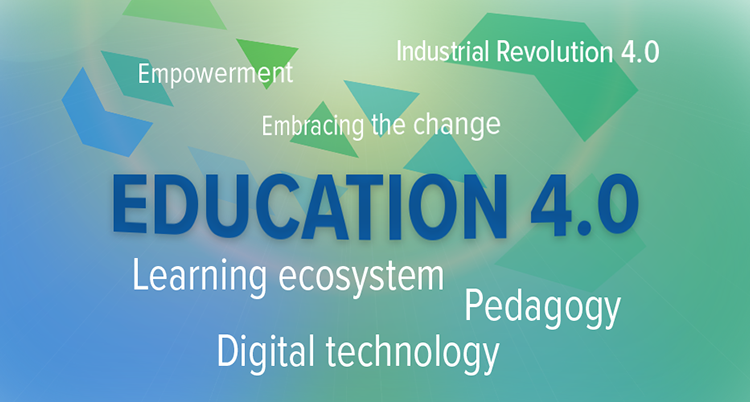Since the First Industrial Revolution (circa 1800), humanity has experienced several major waves of political, economic, social, technological and environmental development. These major waves of development have come to be termed 1.0, 2.0, 3.0, and 4.0 as a way of classifying the major turning points since the First Industrial Revolution.
Many people believe that the world is now experiencing a fourth wave (4.0) of development. Thus, in the fourth wave, Education 4.0 coincides with Globalisation 4.0, Industry 4.0, Society 4.0, Web 4.0 and Environment 4.0. This broad system of classification can serve as a useful mental model to bring clarity to the key factors driving global development.
Globalisation 4.0 is characterised by hyper-connectivity and the rapid (or instantaneous) movement of goods, capital, energy, people and information as a result of advanced interconnected supply chains, transportation systems, financial systems and communication systems.
Industry 4.0 is characterised by advanced integration of digital, physical, and biological systems including, among others, artificial intelligence and human-machine interfaces.
Society 4.0 is characterised by the development of a new humanistic value system and social contract that puts the well-being of people and the planet first and that creates hyper-intelligent systems that co-evolve in the service of humanity and the planet.
Web 4.0 (the symbiotic web) is characterised as the internet of things, an electronic space where humans and machines will interact effortlessly through AI interfaces and highly intelligent self-learning systems.
Environment 4.0 makes use of emerging innovations such as blockchain, big data analytics, drones, artificial intelligence and other technologies and processes in order to create a fully circular economy which protects and regenerates the environment, eliminates pollution and greenhouse emissions, implements economy-wide renewable energies and achieves the Sustainable Development Goals.
Environment 4.0 also brings with it many ethical concerns related to assisted evolution, ecological restoration and species de-extinction, among others.
Education 4.0
Using the system of classification described above, global education has entered into its fourth wave of development (Education 4.0) (circa 2015 to present).
As a result of the massive and ubiquitous changes occurring in the political, economic, social, technological and environmental spheres, the fourth wave of development is characterised by several intertwined factors, including diversity, equity, inclusion, complexity, uncertainty, risk and hyper-connectivity.
As such, creative learning, lifelong learning, inter- or transdisciplinary learning and personalised student-centred learning based on humanistic values lie at the heart of Education 4.0.
For instance, UNESCO believes that higher education should reorient its mission, vision and values along three interrelated themes:
- the need to develop interdisciplinary and transdisciplinary teaching, learning and research;
- the need to become fully open institutions by focusing on diversity, equity, inclusion and humanistic values; and
- the need to take a more active role in society by partnering with other institutions to serve the interests of the common good.
Education 4.0 cannot be isolated from changes occurring around the world. In its fourth wave, education, at all levels, needs to be more flexible and dynamic to respond to emergencies (for example, the COVID-19 pandemic), where distance education has been a “forced choice” rather than a pedagogical option.
Instructors’, teachers’ and students’ technological skills continue to develop around distance education and online learning communities. In its fourth wave, educational policies, curricular, pedagogical and assessment practices must reflect the demands, opportunities and realities of the modern era.
Educational institutions have a social obligation to prepare students for the society and workplace of the future.
To achieve this type of institutional transformation, education leaders should be bold in their vision and in their actions. This type of transformation requires a transformative and inclusive mindset – a mindset that is better suited to the realities of the emerging world.
As humanity moves deeper into the 21st century, it will become increasingly important that the political, economic, social, technological and environmental spheres work more harmoniously in order to address some of the most intractable problems facing the world.
By better understanding the forces acting on the world, and adjusting our educational systems accordingly, humanity will be better able to create a more sustainable planet for future generations and, ultimately, a more prosperous and peaceful future for all.
Our educational systems need strategies to facilitate efficient, effective and sustainable shifts, transformations and transitions to adjust to the many expected and unexpected changes. It is more important than ever that, in such an era of transformative leadership, students’ voices be heard as future leaders and transformers of society.
In a very rapidly changing world characterised by many anticipated and unforeseen variables, one of the main roles of transformative leadership is to create avenues of certainties during uncertain times.
The future of the world will depend, in large measure, on the world adopting a new mindset based on justice and rights at all levels (human, animal and environmental), which puts the welfare of the planet as a top priority.
To that end, education, in the fourth wave, will play a critical role in helping to mainstream sustainable development around the world.
Source: https://www.universityworldnews.com/post.php?story=20220706155955415

